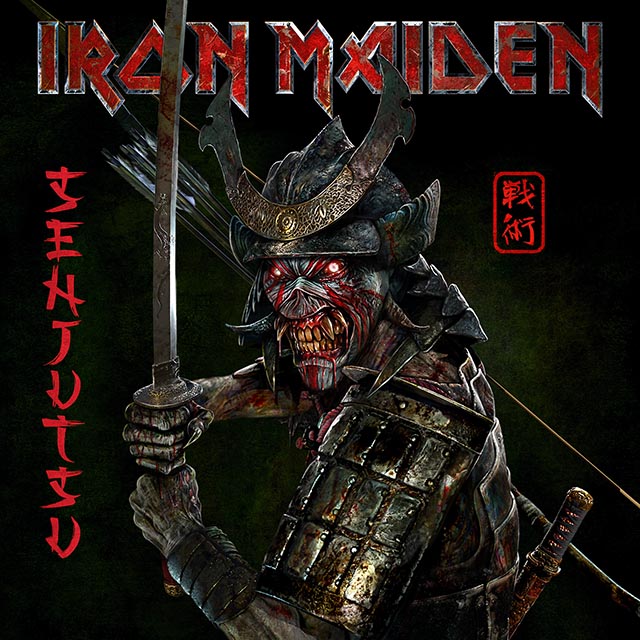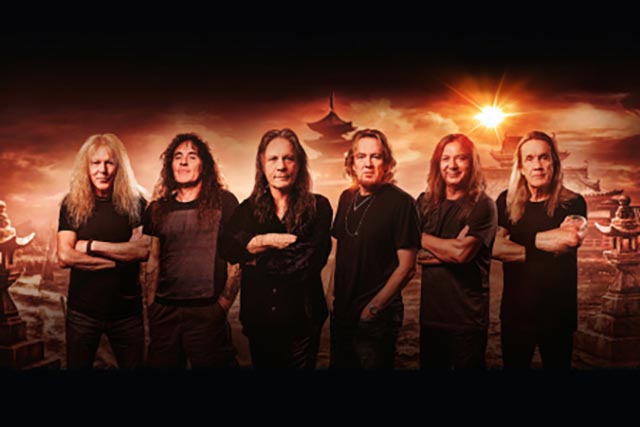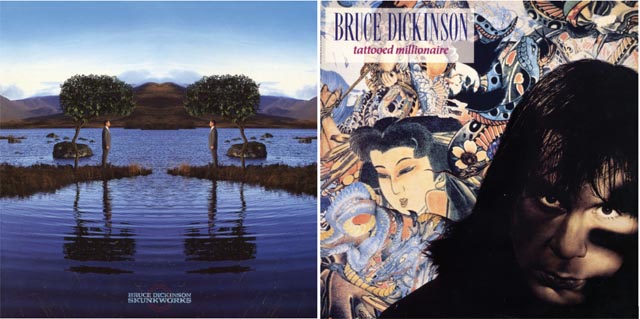
On Friday (3rd), Iron Maiden released their first new album in six years with Senjutsu. While we at Metal Insider have shared our thoughts on the metal icon’s first new single, “The Writing On The Wall,” we decided to expand our opinion by sharing our feedback on the new record.
Jeff Podoshen: After listening to this, I have to say that the guy who posted “Sounds like Iron Maiden with the handbrake still on” probably summed up my thoughts best. Is it a bad record? No. Is it a good record? Maybe. Is it anywhere near the best Maiden has ever done? No way. Perhaps the entire record should have been called “Lost in a Lost World” instead of the one meandering track. In terms of production, I have no idea what Kevin Shirley is trying to do here anymore.
Zenae Zukowski: I was skeptical listening to Iron Maiden’s Senjutsu. After hearing the first single, “The Writing on the Wall,” from our previous Headbangers’ Brawl, I wasn’t sure how the full-length album would play out. After six years with Book of Souls, I can now say that it was an OK album, and “Empire of the Clouds” is the only track I go back to. With, Senjutsu, is it going to be the raw, heavy Maiden style like the classics “Hallowed Be Thy Name” or “Seventh Son of a Seventh Son?” Definitely not. However, I am pretty pleased with this album, which makes my year-end list quite tricky to piece together. I agree with Jeff; maybe the title should have been “Lost in a Lost World,” there’s so much about this song that I can personally relate with, especially with what’s happening in the world today. Secondly, it’s the strongest song on the album, and I would love to hear it live if Iron Maiden can make it out to the states again. Other great tracks are “Days of Future Past,” “The Time Machine,” and “Hell on Earth.” Overall, it’s a fantastic record, and I’m very happy with it.
Mark Smitty Neal: Iron Maiden’s Senjutsu should come with a warning label that reads, “Caution smoking weed when listening to this album can cause boredom and drowsiness.” First, let’s start with who’s idea was it to open the album with an 11-minute song. Basically, the entire album is filled with long, drawn-out songs that all relatively sound the same. The only songs that truly stand out to me are “Stratego” and “Days of Future Past,” and while adding to a mix of lengthy tracks, it seems that these just seem to get lost in the mix and are over before you know it. The album really comes off as one long, dragged-out battle that doesn’t see much action, a moment in their setlist when you get up to hit the bathroom and grab more beer. I grew up in the 80’s listening to Maiden and Priest. Amongst others, that’s what molded me into the metalhead I am today. I will always be a lifer when it comes to Maiden, hell they’ve been doing this for 41 years, but after a six-year hiatus of new music to release “Senjutsu,” I think it’s safe to say there may not be much fuel left in the tank of new music. Overall the album isn’t terrible, but it’s not good either. I’d be happy enough with just seeing them continue to play amazing live shows.
Matthew Brown: If Maiden put out an album that solely consisted of Bruce Dickinson gargling saltwater for an hour, I’d listen to it. Which is to say I’m a fanboy, so of course, I enjoyed my first listen of Senjutsu. Stylistically, it reminds me of The X Factor and A Matter of Life and Death in that it’s a slower, contemplative album full of longer, cinematic songs. That’s not going to please everyone, not least of all because those two albums aren’t highly ranked among casual fans, the former being a Blaze Bayley album and the latter being an album the band played in full on tour, taking up slots that would have gone to the classics. I, on the other hand, love those albums, so I was intrigued to see Maiden heading down that path once again.
“The Writing on the Wall” has continued to grow on me, and I really do enjoy the chorus. Other standouts include “Lost in a Lost World,” “The Time Machine,” and “Hell on Earth.” I also liked how “Death of the Celts” had some melodic similarities to “The Clansman” from Virtual XI, and I’d be curious to know if that was a conscious choice. Speaking of Bruce, he really dominates the first half of the album, more so than usual, with vocal melodies and lyrics that really push the storytelling button Maiden is known for.
Time will tell how this album ages, but I had a good time with it. It won’t be for everyone, and I don’t blame them; there aren’t many instances of the band’s signature galloping rhythm. That said, I’m excited to jump back in for another listen.
Siegfried Samer: I am admittedly not the biggest fan of the Iron Maiden oeuvre post-Brave New World, as the band has not only slowed down the general speed and intensity of their songs considerably, arguably due to the band members getting older and it becoming more and more difficult for them to play faster songs, but also replaced their more focused and streamlined songwriting of yore in favor of longer and more complex, slightly progressive tracks.
Now I would be fine with a more progressive attitude when it comes to songwriting – if that songwriting is strong enough to support these choices. With the very clear and, dare I say, narrow spectrum in which the typical Iron Maiden sound operates, putting multiple ten-or-more minute epics on a single album and keeping them all interesting enough throughout to warrant that choice and silence any potential naysayers that could claim the band might be just filling for time, I, however, consider quite the challenge. The problems I have with the later Iron Maiden works originate therefrom more often than not; Maiden seem just to be circling through the same or very similar patterns in seemingly endless loops of interchangeable sequences. Most of them being a variation of the typical Steve Harris galloping riff (albeit played a bit slower than they used to be), with those same patterns occasionally also being played in an acoustic, undistorted fashion.
This type of songwriting can get tiresome at some point, and it did so for me on this album’s predecessor, “Book of Souls,” which, apart from the single “Speed of Light,” could not really capture my attention or my heart. While “Senjutsu” uses many of the same concepts in that it relies heavily on the sprawling, pseudo-epic songwriting with over eighty minutes total playing time and a whopping four songs that clock in beyond or around the ten-minute mark, for some reason, this album has a stronger sense of personality to me than “Book of Souls.” The melodies, both when coming from the vocals or the lead guitars, respectively, have almost a constant melancholy touch throughout. I would be remiss not to mention the lyrics as an absolute high point of the album for me. Iron Maiden’s typical historical focus is on full-on display here, and the wording is some of the most memorable and touching that I’ve read in a while.
So overall, I would rate “Senjutsu” with a 7 out of 10, even though the lyrics alone could bump it up to an 8 out of 10. High points for me are the second single, “Stratego,” for being the most focused song on the album as well as the general lyrical content, whereas the excessively sprawling songwriting that sometimes feels like the band tries to make up for the lack of speed and intensity with the sheer amount of time spent in a single song knock it down a peg. At the end of the day, it’s definitely one of my preferred albums from Maiden’s later phase, and one of the better ones after “Brave New World,” which I still consider the band’s last big hurrah and a truly strong and standout album from beginning to end.
Bram Teitelman: An artist many feels is past their prime puts out a bloated, self-indulgent release that’s in need of editing. But enough about Kanye West’s Donda. That said, after a few listens to Senjutsu, I can’t say I’m not a bit underwhelmed. Iron Maiden has long been one of my favorite bands, and like any band that you get into as a teenager, it’s that work that drew you to them in the first place that likely has the most connection. In this case, of course, it’s the band’s first seven albums. Knowing that they’re not going to write anything with the fire of “The Trooper” or “Aces High” anymore, it’s easy enough to grade their latter-day work on a curve. That being said, the cons outweigh the pros on this one for me.
The album is front-loaded with its best songs. We already discussed “The Writing on the Wall,” and the uptempo “Stratego” is the closest we get to a banger on this ten-song album. Other album highlights to me were “Lost In a Lost World” and “Darkest Hour,” a ballad that’s the most melodic song on the album. What we’re more or less left with aside from that is a lot of mid-tempo songs that take their time getting set up that are honestly sort of interchangeable. Bigger is always better with Maiden’s stage show, but I’m not sure why both of their last two albums were double albums. The number of double albums that hold up to repeated listens probably can be counted on two hands, and while it’s hard to fault ambition and drive for a band in their sixties, I can’t help but think this is a little overindulgent. I mean, this album is as long as The Number of the Beast and Piece of Mind combined! And while the band is now elder statesmen that are settled in their ways, the most radical thing they could have done is worked with a producer other than Kevin Shirley and turned in a (gasp!) single album.
That said, there’s still lots to like if you’re a die-hard Maiden fan. The band certainly, maintains their identity, and Dickinson’s voice is still an international treasure. If you like “The Clansmen,” then you’ll also enjoy its sequel, “Death of the Celts.” And there are still some ripping solos from the likes of Smith, Murray, and Gers. Also, to have a band like Maiden still releasing music is keeping metal as relevant as it’s been, and it seems like the natural order of things. We should do our best to enjoy them while they’re still making music. Even a less-than-stellar Maiden album is an event that should be welcomed.











